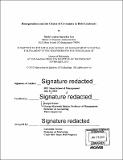Renegotiation and the choice of covenants in debt contracts
Author(s)
Saavedra Lux, Daniel Andres
DownloadFull printable version (4.258Mb)
Other Contributors
Sloan School of Management.
Advisor
Joseph Weber.
Terms of use
Metadata
Show full item recordAbstract
I investigate whether and how expected future contract renegotiation considerations affect the type of covenants used in ex-ante debt contracts. I find that when future contract renegotiation costs are expected to be high, debt contracts are less likely to include covenants that restrict the borrower's financial flexibility in good states. This finding suggests that when renegotiation costs are high, borrowers and lenders avoid the use of covenants that are more likely to hold up the borrower and force it to bypass value-enhancing corporate policies (e.g., investments). Consistent with this interpretation, the negative relationship between renegotiation costs and the presence of flexibility-reducing covenants becomes stronger when the borrower has fewer outside options and financial flexibility becomes more valuable. Finally, I find that when future renegotiation costs are expected to be high, debt contracts have more covenants that are directly linked to the current performance of the borrower, which allows for a more efficient allocation of decision rights between the borrower and lenders. Overall, this study provides initial evidence about how renegotiation considerations affect the design of covenant packages in debt contracts.
Description
Thesis: Ph. D., Massachusetts Institute of Technology, Sloan School of Management, 2015. Cataloged from PDF version of thesis. Includes bibliographical references (pages 44-49).
Date issued
2015Department
Sloan School of ManagementPublisher
Massachusetts Institute of Technology
Keywords
Sloan School of Management.